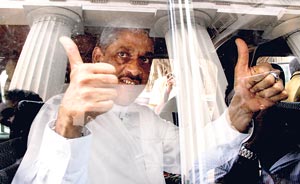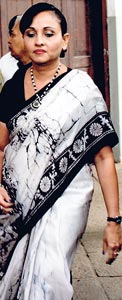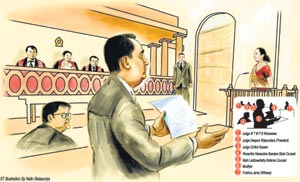| The High Court trial-at-bar, where former Army Commander Sarath Fonseka faces three charges relating to an alleged statement he has made in a newspaper interview, resumed its sittings on Monday with Deputy Solicitor General (DSG) Wasantha Nawaratna Bandara leading evidence from the Sunday Leader Editor Frederica Jansz. Subsequently, Defence Counsel Nalin Ladduwahetti began the cross examination of Ms. Janz
Excerpts of the proceedings
on a day-by-day basis:
MONDAY
The Sunday Leader Editor Frederica Jansz said that a week after the newspaper carried the lead story on the white flag issue quoting former Army commander Sarath Fonseka, the newspaper carried a clarification regarding the same item.
She said, however Mr. Fonseka had not filed action against her or even sent a letter of demand regarding the news item.
 |
| Fonseka gestures a thumbs-up as he leaves the court premises. |
She said Mr. Fonseka clarified that none of the LTTE leaders had surrendered with white flags and they had died during the confrontations.
“After the original news item regarding the white flag issue appeared, there was a controversy. The JVP carried out protests to tarnish my image. Local and foreign television stations interviewed me,” she said.
“Mr Fonseka in a second interview with me said that he took full responsibility for the events which had taken place during the military operations in the north,” she added.
She said the note book containing the notes taken during the interview with Mr. Fonseka was handed over to courts on June 21, 2010 and the book was placed under a sealed cover.
Deputy Solicitor General (DSG): Is it correct that pages in the book remain the same even now?
FJ: Yes.
DSG: Is it that the binding of the book done in such a manner that the pages may have got loose.
FJ: Yes.
Defence Counsel Nalin Ladduwahetti cross examining Ms Jansz asked her whether there was any action filed against the Sunday Leader regarding news articles published.
FJ: No court has ruled that any of the articles written by me has been wrong. However there has been action filed on contempt of court charges.
NL: In which courts?
FJ: In the Court of Appeal by Mr. Thilanga Sumathipala and in the Mt. Lavinia District Courts by Defence Secretary Gotabaya Rajapaksa
NL: Is there an undertaking to courts not to publish news against the Defence Secretary?
FJ: There was an undertaking to courts not to publish adverse things regarding the Defence Secretary. That was given before Mr. Lasantha Wickrematunga was killed.
NL: Isn’t there a case that the undertaking given to courts has been violated?
FJ: Yes. I am on bail on that matter. We have not defamed the Defence Secretary. That should be proved in courts.
 |
| Frederica Jansz arriving for the High Court trial-at-bar hearing |
TUESDAY
NL: Were you aware that the UNP paid Rs. 1 million for a week from the first week of November (2009) to the Sunday Leader.
FJ: That question should be put to the Chairman, Lal Wickrematunge. However, I was aware that money was paid, but I am not sure of the amount.
NL: Are you aware of it now?
FJ: Mr. Ranil Wickremesinghe made a public statement and therefore I am aware of it. I am aware that money was also paid for the advertisements for President Mahinda Rajapaksa. During a police raid on the printing press ‘Mahinda Chinthana’ posters were also found.
NL: The same institution obtained money to support Mr. Fonseka and also obtained money from the other side as well.
FJ: That is a business matter.
NL: Do you personally think it is ethical.
FJ: It is a management decision and the Editorial has no influence over that.
NL: Is it correct that your paper decided to support Mr. Fonseka for money?
FJ: It is not only for the money, but because the government was not doing anything to find those responsible for the assassination of Mr. Lasantha Wickrematunge and also action was being filed against the newspaper. Therefore we decided to support Mr. Fonseka.
NL: You have not mentioned your name in the interview that was published.
FJ: That is not necessary. I did not take down the notes. It was done by Rakmish Wijewardena.
NL: Was he used as the stenographer?
FJ: No, he was a trainee journalist.
NL: You mean such an important interview was done by a trainee journalist?
FJ: No, he took down the notes. I asked the questions. Finally I approved it.
NL: Could you tell us whether there is a difference in some of the pages of your note book which you surrendered to courts?
FJ: No there is no difference.
(The panel of judges examined the note book and made their observations at this point).
WEDNESDAY
NL: You mentioned yesterday that the ‘white flag’ statement by Mr. Fonseka was based on information given by a third party.
FJ: yes
NL: When did you come to know about this?
FJ: During the interview held on December 8, he said he had heard about this, but it was on December 12 when I called him that he said he heard about this from another journalist.
NL: You said the General mentioned to you that he heard it from a journalist on the 12th. But had you written the article by that time.
FJ: I had written the article and wanted to seek the clarification from Mr Fonseka on this. If I had not been able to obtain this clarification, I wanted to publish this on the Following Sunday – December 20.
NL: There are two editions of your newspaper -- the ‘City’ and the ‘Late City’. Is the fact that the white flag statement was given by a journalist mentioned in both editions.
FJ: It is mentioned in the Late City edition and not in the city edition. I instructed the editorial not to go ahead with the printing. But they had gone ahead with the printing. They had printed it without my knowledge
NL: As a senior journalist aren’t you aware that the proof pages are signed by the Editor before going into print?
 |
| The three judges of the trial-at-bar bench: Deepali Wijesundera (C),
W.T.M.P.B. Warawewa (R) and M.S Razeen |
FJ: Yes.
NL: Wasn’t your signature there in this case?
FJ: I had instructed not to publish the item until the clarification by General Fonseka was included. But due to a mess in the editorial it had been published.
NL: Due to your mess the whole country is in a mess. Do you admit that the item was published (in the city edition) without two important paragraphs?
FJ: Yes.
NL: Do you admit that the editorial policy of the paper was sold for Rs. 1 million per week?FJ: No, that money had been taken not for what had been published, but for printing work done.
NL: Didn’t you disagree with the management for selling editorial space for money?
FJ: I told them that it was appropriate to obtain money through advertising, but to improve the printing we had to take money from the party.
NL: Are you aware that the sales of the paper dropped sharply after 2010 and the staff had not been paid their salaries? Some of the employees had not been paid their salaries for two to three months.
FJ: Some salaries for employees were delayed -- but not the salaries of the editorial staff.
THURSDAY
NL: Was the news item on White Flag statement important in your media life?
FJ: No I did not think in that manner. I knew it will create a controversy. I did not think it was personally important for me, but for the newspaper.
NL: You had future hopes of this particular news item?
FJ: No.
NL: You submitted this item for the Editors Guild awards for 2009 for the ‘scoop of the year’ award.
FJ: Yes.
NL: Did you receive an award?
FJ: No.
NL: Were you sorry about this?
FJ: Yes, because the paper did not get the award.
NL: Wasn’t this application for the awards submitted under your name?
FJ: I submitted it under my name, but it should have gone under the name of the newspaper. I was sorry that the award was not received. The panel of judges did not give the award. The panel had persons such as Mr. Lalith Alahakoon and Amal Perera. I accept some of them, but not others.
NL: The article you submitted for the particular award had run into a controversy.
FJ: yes.
NL: There was a clarification regarding the item.
FJ: Though it was a clarification, it was not a denial.
FRIDAY
NL: In your evidence yesterday you mentioned Mr. Amal Perera, the head of the AFP in Colombo. I suggest that there is no such person in that name.
FJ: No there is a person of that name.
NL: There is only Mr. Amal Jayasinghe at the AFP and not Amal Perera.
FJ: Yes I made a mistake.
 |
NL: When you point out the mistake you say you have made a mistake or say that that question was not posed to you earlier.
FJ: Yes I made that mistake yesterday.
NL: You are the Chief Editor of an English newspaper.
FJ: Yes.
NL: Are you aware that Mr. Amal Jayasinghe has recognition in Sri Lanka as well as overseas?
FJ: When you work for a news agency the names do not appear. I am not aware whether he has recognition overseas.
NL: You have accused the panel which consisted of reputed persons.
FJ: No. I referred to the Chairman of the panel. I can’t remember his name.
NL: You can’t remember something you have written 10 weeks back, but you recall the interview which you did in December last year.
FJ: I have notes regarding the interview.
(Due to an interruption of power the court sittings were adjourned)
The next hearing has been fixed for November 2. |





